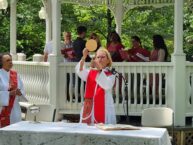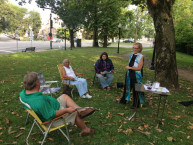 November 29, 2015: May God’s words alone be spoken, may God’s words alone be heard. Amen.
November 29, 2015: May God’s words alone be spoken, may God’s words alone be heard. Amen.
Well, now that we are all full of it – the stuffing, turkey, and pie I mean, we start to consider as we load and unload the dishwasher for the 18th time, the stories shared, the laughter, and of course – the football, and then it dawns on us…that there are only 26 shopping days till Christmas! “There will be signs in the sun, the moon, and the stars…People will faint from fear and foreboding of what is coming upon the world…Now when these things begin to take place, stand up and raise your heads, because it’s Black Friday at the malls!”
Okay, maybe not what Jesus was talking about in the gospel passage from Luke today, but if you have ever been in those crowds, it can seem like the world is coming to an end, right? Now, I know the stores are already in Christmas, but we just entered Advent. Happy New Year! This is the beginning of the church year, and we start today into what we call Year C – the year we hear my favorite gospel, Luke. And as we always do, just like our secular New Year, we start Advent with a few fireworks of our own. We begin with the end, and the end brings about the beginning.
What? No, I haven’t had too much egg nog…not yet. But that cyclical life that I was just referring to is exactly what Jesus is telling us, and what we experience every day and every year. This passage from Luke, like the ones in the other synoptic gospels of Matthew and Mark, is about the return of Christ. Unfortunately, there are some who have taken this second coming in quite a linear way, predicting certain dates for the end times. Now, we know about the recent ones – in fact when I was in seminary, some of my friends gathered at an “end of the world party” – which really was just another reason to have a party. But anyway, these end time stories are not new.
“After 14 years of studying the Bible, William Miller (1782-1849)–a U.S. revivalist who predicted the second coming and earned a large but temporary following of [over] 50,000…became convinced that Christ would return in 1843. When Miller announced April 3 as the day, some disciples went to mountaintops, hoping for a head start to heaven. Others were in graveyards, planning to ascend in reunion with their departed loved ones. Philadelphia society ladies clustered together outside town to avoid entering God’s kingdom amid the common herd. [gotta love it] When April 4 dawned as usual the Millerites were disillusioned, but they took heart. Their leader had predicted a range of dates for Christ’s return. [seriously, sound familiar?] They still had until March 21, 1844. The devout continued to make ready, but again they were disappointed. A third date–October 22, 1844–was set, but it also passed.”[1]
Now, if only one little boy had heard about Mr. Miller, it would have saved him some trouble. It seems that when Bobby was just in the fifth grade, his parents were having a hard time trying to get him to do his homework. Even stories about being good for Santa weren’t working (it was, after all, springtime at this point). Finally they told him that Jesus was coming, and he had better shape up before Jesus got there, to which Bobby replied “Well, in that case, Jesus can do the homework. After all, you KNOW he knows all the answers.” I think the next moment for Bobby likely felt like the end times.
But these folks miss what Jesus is saying, taking a very linear view of this birth, death, resurrection, ascension, and return thing. Like the return was the end. But look at what Jesus is saying here: “Truly I tell you, this generation will not pass away until all things have taken place.”
And they have, during the life of those earliest disciples. Now, that may seem strange to hear, but let me share another story with you.
When I was a seminarian, I was visiting a friend’s weekday service. It was a small group of mostly older parishioners, gathered there for that Thursday noon Eucharist. The readings were about this passage. The priest, the Rev. Melissa Hall, who preached here at my installation as rector, was asking the folks if they believed that Jesus was coming again. They all said “Yes.” And then, she asked me directly. And without much thought, I said “Jesus already came. The second coming has happened.”
The old ladies in the pews looked at me like I was nuts. I am nuts, but that’s nothing new to any of you, right?
I continued. “Jesus has returned, and is coming today, and will come tomorrow.” My mentor looked at me and smiled.
Of course if we think about it, it makes perfect sense. I mean we do say on most Sundays “Christ has died. Christ IS risen. Christ will come again.” Right? But have you thought about what that really means?
I was visiting my family in Maryland this Thanksgiving – something I don’t do enough of, and don’t stay long enough either, to be sure. We are an odd bunch…there’s a lot of love, and we push each other’s buttons, to be sure, but that’s family. And as I walked to my car after a far too short visit with my Dad, step-mom, and her family on one day, and my mom with my brother my sister in law and my nephews on another day, I was sad. I wanted to stay longer, and I missed them before I even left. And then I thought about Advent (I was, after all, leaving to go home to write this sermon), and I thought about how Jesus was with his disciples, and yes, they pushed his buttons too, and I am sure that they felt he left them far too soon – after only three years. And yet, Jesus didn’t leave them, and ultimately, they didn’t leave Jesus either.
In his death, they thought they lost him, but Jesus returned for them. In their ministry, in becoming the body of Christ alive in the world in their time, Jesus returned continually through them. And Jesus returns continually through the ages in us – the saints of our day. It is a never ending cycle of love and relationship, of beginnings that end, and then begin again. The incarnation is not a straight line thing, but a circle – a continuous circle of love.
It made sense even more for me after visiting family, because this continual cycle of incarnation is a deeply personal thing, just like my family, and perhaps like yours. For those whose families are not loving, and that does happen far more than we would like to consider, think about the other families in your life – the ones you define by love. Because blood may be thicker than water, but love trumps all. And even if visits with our families, biological or otherwise, may be long apart and shorter than we’d like, those who love us are always with us, and we with them. And whenever we see them again, the love is there waiting, as though no time had passed…and that is because in some very real way, we are never ever apart from those we love – not really – not even after death.
God is like that. God was with us, and is with us, in much the same way. That is what we celebrate year after year. God loved us so much as to be willing to walk among us – despite what that meant – despite the pain, because God knew that being physically present was the best way to be in relationship with us, to share love. God knew that physicality mattered, and so came to us in the form of Jesus, and because of that, God has in her heart always the experiences of the incarnation – the relational love experienced in Jesus – and we carry that relationship with Jesus in our hearts too – connecting us always with God.
Now, the thing is, despite knowing that the love is always there, I know that I need to see my family, far more than I do, because that matters too. And by seeing, I don’t mean the kind where we are in the same room together, but looking down at our phones – that, my friends, is NOT the way it should be done. Nor is it the way for us to be in relationship with others in our lives outside of family, is it. And just as that is true for me, it is also true for all of us as Christians.
As the body of Christ we need to be in relationship with one another, and with the world. We need to, as Jesus said, “stand up and raise our heads,” (how Jesus could have known about our addiction to our mobile devices I will never know). We need to raise our heads from whatever is distracting us from our loved ones – the TV, text messages and email – whatever it is – put it aside and see the Christ in them, in your neighbor, in all of creation…and in yourself. The Christ that was, and is again – in you and in all the world.
How does that change Advent for you – to realize that this isn’t some sort of remembrance play we act out each year about something that happened long ago – but that Jesus is continually born in us? How does it feel to consider that this return of Christ we hear about isn’t far off in some distant future – but that it IS happening now, happened yesterday, and happens tomorrow – and each of you are active agents in that continual returning incarnation of God? I don’t know about you, but it sure makes coming here, and then living my life out in the world, something more powerful than I could ever have imagined. And THAT – THAT is what Jesus was hoping he could bring to all of us – that realization of who we are – beloved children of God – partners with the Holy Spirit in the work God is already doing. We just need to answer Christ’s call to us to love one another as he loved us.
We are the body of Christ! Jesus is born in us, lives in us, and continues to be seen in us in all the world, just as we see Christ in one another. And this ever evolving truth is something we experience liturgically in the church – we wait for Jesus in Advent, celebrate his birth during the twelve days of Christmas, he is revealed to us in Epiphany as the Incarnate One, we follow him to Jerusalem in Lent, and stand at the Cross on Good Friday. We celebrate his resurrection in Eastertide, and the birth of the church at Pentecost, and experience the workings of the Holy Spirit in the early church. On All Saints, we celebrate all those who have been a part of the body of Christ in days gone by, and then we are back in Advent (or we should be – and once were in the early church), hearing about the second coming.
We begin with the end, and then the end brings about the beginning. This second coming isn’t an ending, but a beginning, and it happens all the time.
Now before we get all cozy in this never ending story, let’s consider for a moment the passage from Jeremiah today. The prophet, speaking the words of God, says “In those days and at that time I will cause a righteous Branch to spring up for David” Well, that’s familiar… must be Jesus, right?
Okay, great. But let’s read on… “he shall execute justice and righteousness in the land.” Well, that’s good too. Jesus was always taking people to task for not caring for the poor, the widowed, the orphan, the stranger.
Good so far, right?
In our Advent candle lighting at the opening of today’s service, we said responsively: “Today we remember the prophets of old, who demanded to be heard, who dared to speak of a child to come, unexpected liberator of the people, vulnerable incarnation of the Holiest of Holies, a new name for God. Today we give thanks for the prophets among us, who bring to us surprising new visions of hope, who challenge us to think outside the box, who show us a future we never anticipated. On this first Sunday of Advent, we light this candle as a symbol of the prophets who renew our faith and remind us of what may be.”
The prophet Jeremiah is telling us something – something Jesus was trying to teach his disciples – something we need to also understand today. Jesus was there to teach us about the kin-dom of God, and our part in bringing it about. Jesus was that righteous branch, and as the body of Christ alive today – as with all others who were baptized into him in days before – we are called to live as Jesus lived. We are the righteous branch, and we need to claim that identity – to live into it!
In Advent we await the birth of light into the darkness of the world, the entry of God in Jesus, and into our hearts. And this start to our church new year at Advent is prophetic, giving us an opportunity to renew our faith and remind us of what may be, if we live out our lives as part of the continual incarnation of God in the world – the body of Christ alive today.
So how about a few New Year’s resolutions that really mean something. How about we make them now as part of our church new year? Maybe include things like visiting family, however we may define it, calling friends with whom we have lost touch, reaching out to our neighbors who live alone. But if we are to really “stand up and raise our heads” in this world, where so many live in times such as Jesus described, filled with “fear and foreboding of what is coming upon the world,” we should add these to our resolution list too: that in this new year we will offer aid to the poor and the stranger, stand up for the marginalized, and be the “righteous branch of hope” for a world in desperate need of it.
Now THAT would be a set of New Year’s resolutions worth making! And to help us all to keep them, I leave you with the words of St. Paul heard in the reading from 1 Thessalonians this morning, who was writing to encourage the newest members of the body of Christ at that time, “…may the Lord make you increase and abound in love for one another and for all.”
Happy New Year!
Amen.
For the audio of the sermon from the 10:30am service, click here:
[1] Today in the Word, MBI, December 20, 1991.
The Rev. Diana L. Wilcox
Christ Church in Bloomfield & Glen Ridge
November 29, 2015
Advent 1 – Year C
1st Reading – Jeremiah 33:14-16
Psalm 25:1-9
2nd Reading – 1 Thessalonians 3:9-13
Gospel – Luke 21:25-36






